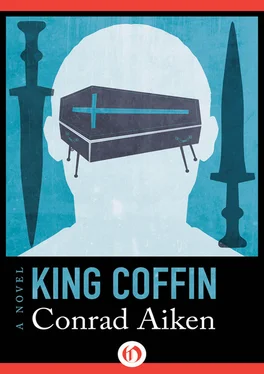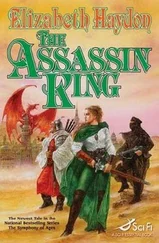The bell rang, the doors slid softly shut, recoiled from rubber flanges, shut again more firmly, the motors began their ascending whine, and his eye rose to the long line of advertisements above the porcelain handholds. A salesgirl was saying — wash it with Ivory. When years steal away the gold, restore the golden hair of girlhood. Golden Hair Wash. Priceless the life of a child.
The detective impulse, the spying mania — it would be possible to evolve the natural history and origin of that, one could develop it ad lib ., trace it from childhood up, but what would be the use, it was all quite clear, it could be seen very neatly and comprehensively in perspective: the reading of forbidden books, the exploration of forbidden streets, the cultivation of forbidden acquaintances, the special sharp delight in all duplicity, above all the really exquisite pleasure in knowing more than one was supposed to know. Reading, for instance, the doctor’s letters about Kay, the reports of the teachers and psychiatrists; watching the anxiety of father and mother; observing the subtle deterioration of Kay. More recently, his new game (and what a joke that it was Julius Toppan who had put the idea in his head) of picking out a stranger in the street and following him — but again it was sufficient simply to note this, and to see that the Jasper was the same Jasper, the same superior consciousness, the same one whose perceptions had the invisibility of extreme subtlety. It was the Jasper who loved to keep secrets, and who prevented his friends from becoming intimate: who had a kind of genius for dividing up his daily life into separate departments, so that no one individual knew anything more of him than the one department to which he had been assigned. Very satisfactory, it gave one an enormous advantage with people if one could thus play on their defeated curiosity: it gave him the whip hand with Sandbach and Gerta, even now they were beside themselves with frustration, though they didn’t like to admit it, and were clearly upset because they didn’t know what he was going to do. They felt something impending, they knew they were in the midst of a crisis, they suspected danger, but what shape it would have they couldn’t guess. Nor whether perhaps the whole thing might not turn out to be a joke.
— The post office buys the stamps?
— Yes.
— And they give the girls that space?
— Yes.
— She has three windows?
— Yes, she has to sell a hundred dollars’ worth of stamps—
— Well, I don’t know, I don’t understand it.
— Why should the post office—
— and a rake-off on every stamp she sells—
He took out his pipe, looked to see if it was empty, put it to his mouth and blew out the little bubble of caught moisture in the stem. Yes, he had them on the run, and all by the simplest turn of the wrist — a postcard to Gerta, saying dislocation number one, another to Sandbach, saying dislocation number two, and then the quick little insult to Gottlieb at the C Bookshop, in the presence of Mrs. Taber, she standing there astounded, her mouth open, the gaps in her teeth showing, the ragged little feather duster in her hand. Amateurs, you are all sickening little amateurs, not one of you has any guts, not one of you would have the guts to act alone, to take any risk by yourselves. It’s all play-acting, exactly like the tiresome tepid little immoralities of Beacon Hill and Fayette Street. No brains, no pride. Just rats. You go round together like rats.
— Say you are selling light wines—
— Well, now listen, how would it be if—
— That to me is outrageous, why should they pay that woman a rake-off, it’s the cheapest service—
Like all human situations, the thing was a composite, the elements in it were on at least two different planes, if not more; above or below his abandonment of federalist anarchism, his abandonment of the “cause” and the Boston Group, was his sharp warning to them that there was to be a personal change as well, that he had risen above them and was henceforth consigning them to a lower circle. It was this which they found painful and bewildering, their affections and pride were hurt, Gerta’s affections, Sandbach’s pride, he was hurrying them into a defensive alliance which they both found humiliating, and insofar as they had thought they possessed him they now felt exposed and defrauded. Certainly they were feeling rushed, they had been caught unaware by the sudden action, the unexpected psychic speed, it was as if he had forced them into an emotional stammer; but the question was, whether he himself could now stand outside the results of his action, avoid being caught in his own whirl, get away in time to a higher and safer ground. The question was also whether he knew quite where the hurry was going to lead, and quite why it had happened, or happened so suddenly. The sense of hurry was at any rate acute, he had felt it mounting day by day and hour by hour, as if there were somewhere a destination (a little vague) to which he must go with the utmost directness and despatch: the sense as of a map spread out before him, and a watch ticking excitedly in his hand, and nearer every moment the sound of a coming invasion. He was going to do something, he must do something, there must be the final action by which he would have set the seal on his complete freedom. To escape the company of rats, to express the profundity of his contempt — to kill a rat—!
His eyes rose slowly and heavily from the thought, he saw the knees of the man before him, a loose thread, the edge of the soiled and worn coat, he heard the man’s voice saying post office, in the post office, observed the little fold of shirt protruding between trousers and waistcoat, resented the oppressive nearness of the strange human body, and got up from his seat angrily and abruptly. He pushed contemptuously between the two men, sundering them, was aware of their turning heads, looked back at them with a little smile as he squared his shoulders through the crowd, and pressed toward the opening door. A moment later, as he walked quickly along the cement platform, he found himself laughing, and slapping his hand against his side, he felt a little drunk, a little drugged, for if his eyes had risen heavily from the thought he had himself risen as heavily, it was almost as if he had experienced a slight blow on the head, a concussion. Something had happened, something important had happened! It was always like that. It always came like that. There was just exactly that kind of accidental conjunction of idea and fact — the thought occurring precisely at a moment when the mere physical nearness of a stranger’s human body was beginning to oppress and stifle him, making itself felt as an unwarrantable and disgusting intrusion. The feeling of hatred, intolerable hatred, had come like a flash and had revealed to him as never before the rightness and terribleness of the deed : as under lightning, the whole landscape leapt out of darkness in green and maplike and logical minuteness. The mere presence of the strange human body had shown him not only what he wanted but exactly why he wanted it. And not only that, but also how right had been the idea.
The discovery, as he ascended on the escalator and emerged under the red brick tower at Park Street, had an odd effect on him. He looked round him with a sharp sense of relief and detachment, he felt alone and tall and superior amongst the disorderly crowd of nocturnal pedestrians, and almost indeed as if he belonged to a different race or species; and as he stood still by the corner, observing first one face and then another, one hand jingling pennies in his pocket, the other holding his unlighted pipe, it occurred to him that a cat must feel something like this: a cat alone in a cellar, sitting perhaps on the top of a flour barrel, and watching the naïve and unconscious antics of mice. Close at hand, in an Independent taxi, the driver was reading The Traveler . Red Sox Win Slugfest with Senators. The solemn face was chewing gum. A woman stepped out into the street in front of the cab, paused, looked into her bag, checked her balance as if to come back, then quickly resumed her way. A voice behind him said, the clock says quarter to nine, my watch must be slow, and two young men, wearing identical brown felt hats, approached the taxi with obvious intent. The driver leaned forward to hear the address, Lenox Hotel, clinked the flag down, and in a moment the two felt hats, behind the door of the cab, described a pair of parallel curves round the corner into Tremont Street and were gone. It would be easy and amusing to follow them? And there was now, all of a sudden, plenty of time — for with the sense of relief had also come a curious alteration of his sense of hurry — as if the hurry need no longer be transacted externally, but could become, and without pressure, concentric , an affair of his own, a mere matter of revolving within or around himself. No, the time had now come, as he might have foreseen, for a careful weighing, a careful and cautious inspection; a period of leisure and close scrutiny; and if there was still an urgency, such as was now causing his heart to beat a little more rapidly, it was wholly private. Between his own world and the world outside, a peculiar division had now arrived, and if time still existed importantly for himself, it had no longer any important existence elsewhere: in his own kingdom, the kingdom of thought, he could move as rapidly as he liked, stay as long as he liked, the outside world would meanwhile stand still, and he could rejoin it whenever he wished, and exactly at the point at which he had left it. The situation, or series of situations, which he had created, would remain as if suspended until he chose to resolve them: Gerta would be waiting. Sandbach would be waiting, everything would hang motionless in a kind of timeless limbo. So clear, so beautiful, was this impression, this divination, that he paused to give it visual form. It was like the story of the sleeping beauty — a whole world suddenly frozen into stillness — or the tranced figures of the Grecian Urn. The anarchist meeting in Tremont Temple would still be there, when he got there after his voyage upon voyage round the world, Sandbach would still be holding the black and sticky stump of a cigar in yellow fingers, and saying yes I think maybe, yes I think maybe but do you agree with me, Toppan would still be taking a safety razor blade from his pocketbook to sharpen a smooth red pencil, Gerta would be standing at her window to look at the Charles River Basin, a book opened before her on the window sill, an apple in her hand. They would be listening, they would be waiting, and for what? To be destroyed. To be touched, and waked, and destroyed.
Читать дальше












